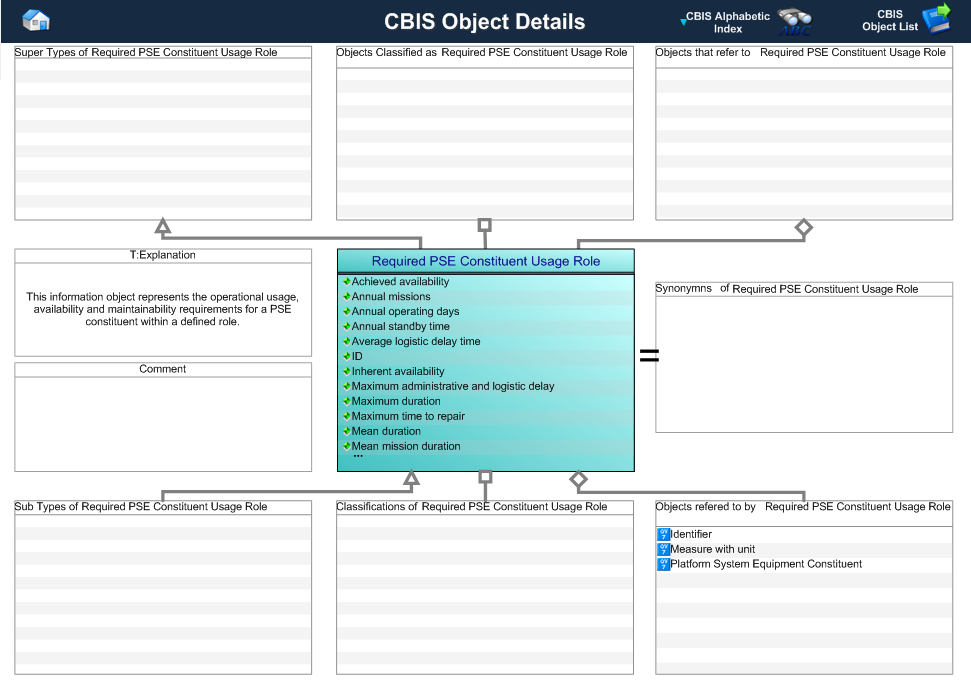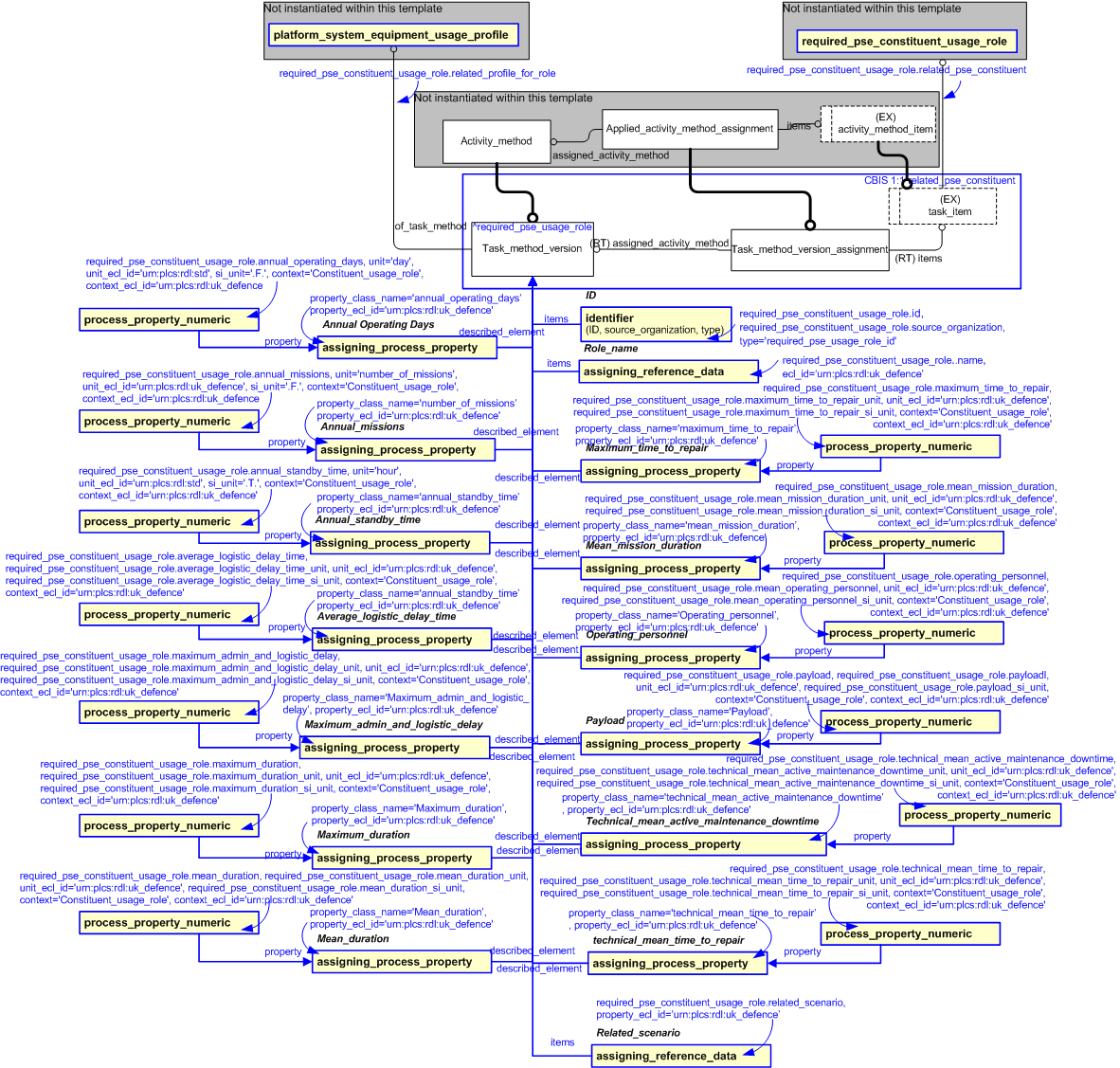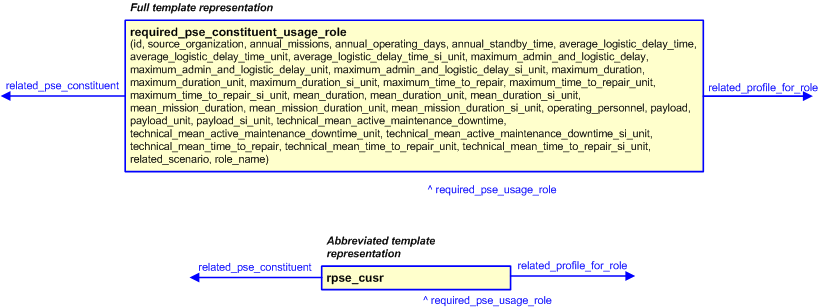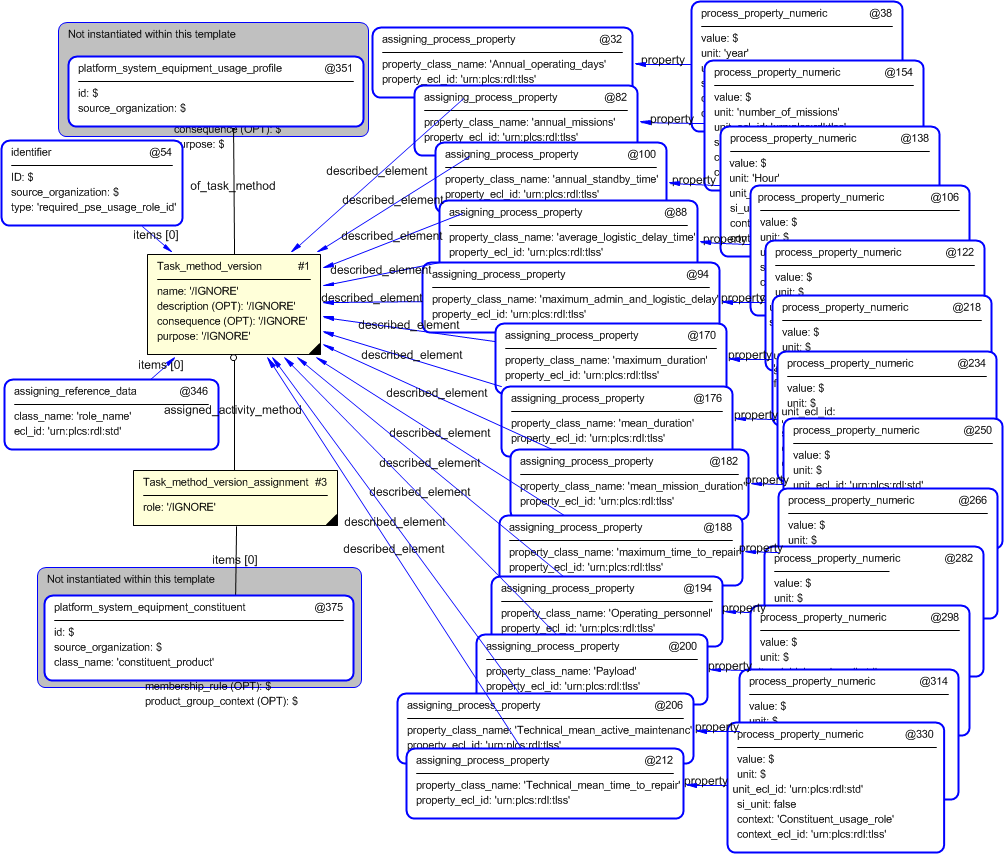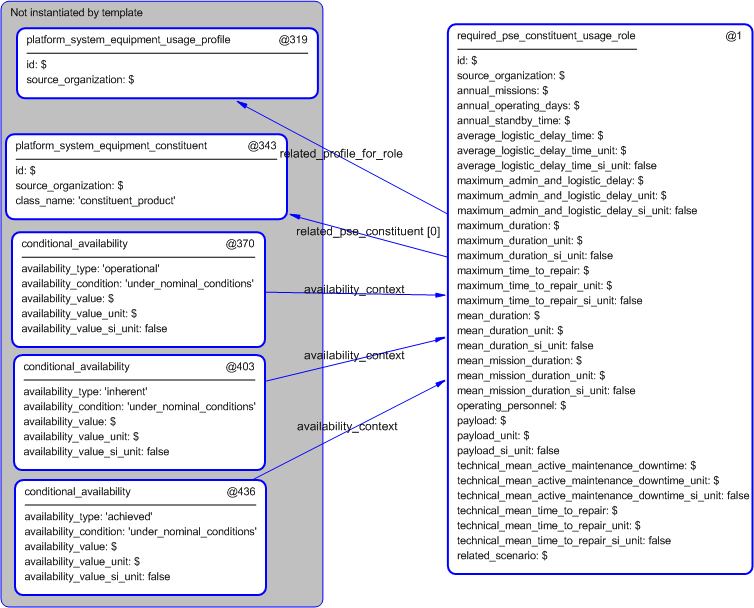This section specifies the template required_pse_constituent_usage_role.
NOTE
The template has been defined in the context of
UK_Defence.
Refer to the business context for details of related templates.
NOTE
An explanation of a template and the associated instantiation path is
provided in the
Template overview
section.
The following input parameters are defined for this template:
The following reference parameters are defined for this template:
The instantiation path shown below specifies the entities that are to be
instantiated by the template.
-- create the task method version to represent the required_pse_usage_role Task_method_versionTask_method_version.name = '/IGNORE'
Task_method_version.purpose = '/IGNORE'
%^required_pse_usage_role =
Task_method_version%
-- create the relationship to link the related profile Task_method_version.of_task_method ->
@related_profile_for_role-- create the assignment to link the pse constituent Task_method_version_assignmentTask_method_version_assignment.role = '/IGNORE'
Task_method_version_assignment.assigned_activity_method ->
^required_pse_usage_role
Task_method_version_assignment.items ->
@related_pse_constituent-- identifier /
identifier(
ID=@id,
source_organization=@source_organization,
type='required_pse_usage_role_id',
items=^required_pse_usage_role)/
-- Annual Operating Days /
assigning_process_property(
property_class_name='annual_operating_days',
property_ecl_id='urn:plcs:rdl:tlss',
described_element=^required_pse_usage_role)/
-- Assign reference parameter -- not sure if needed - can we not substitute this string inside the call to process property? %^annual_operating_days = $assigning_process_property.property%
-- Value and Unit /
process_property_numeric(
value=@annual_operating_days,
unit='day',
unit_ecl_id='urn:plcs:rdl:std',
si_unit='.F.',
context='Constituent_usage_role',
context_ecl_id='urn:plcs:rdl:std',
property=^annual_operating_days)/
-- Annual Missions /
assigning_process_property(
property_class_name='annual_missions',
property_ecl_id='urn:plcs:rdl:tlss',
described_element=^required_pse_usage_role)/
-- Assign Annual Missions reference parameter -- not sure if needed %^annual_missions = $assigning_process_property.property%
-- Annual Missions Value and Unit /
process_property_numeric(
value=@annual_missions,
unit='number_of_missions',
unit_ecl_id='urn:plcs:rdl:tlss',
si_unit='.F.',
context='Constituent_usage_role',
context_ecl_id='urn:plcs:rdl:tlss',
property=^annual_missions)/
-- Annual_standby_time /
assigning_process_property(
property_class_name='annual_standby_time',
property_ecl_id='urn:plcs:rdl:tlss',
described_element=^required_pse_usage_role)/
-- Assign Annual_standby_time reference parameter -- not sure if needed %^annual_standby_time = $assigning_process_property.property%
-- Annual_standby_time Value and Unit (opted for hours - as couldn't see cbis definition /
process_property_numeric(
value=@annual_standby_time,
unit='hour',
unit_ecl_id='urn:plcs:rdl:tlss',
si_unit='.T.',
context='Constituent_usage_role',
context_ecl_id='urn:plcs:rdl:tlss',
property=^annual_standby_time)/
-- Average logistic delay time /
assigning_process_property(
property_class_name='average_logistic_delay_time',
property_ecl_id='urn:plcs:rdl:tlss',
described_element=^required_pse_usage_role)/
-- Assign average logistic delay time reference parameter -- not sure if needed %^average_logistic_delay_time = $assigning_process_property.property%
-- Average logistic delay time Value and Unit (opted for hours - as couldn't see cbis definition /
process_property_numeric(
value=@average_logistic_delay_time,
unit=@average_logistic_delay_time_unit,
unit_ecl_id='urn:plcs:rdl:tlss',
si_unit=@average_logistic_delay_time_si_unit,
context='Constituent_usage_role',
context_ecl_id='urn:plcs:rdl:tlss',
property=^average_logistic_delay_time)/
-- availability_value is now assigned to the required_pse_usage_role, not part of it. -- Maximum_admin_and_logistic_delay /
assigning_process_property(
property_class_name='maximum_admin_and_logistic_delay',
property_ecl_id='urn:plcs:rdl:tlss',
described_element=^required_pse_usage_role)/
-- Assign Maximum_admin_and_logistic_delay reference parameter -- not sure if needed %^maximum_admin_and_logistic_delay = $assigning_process_property.property%
-- Maximum_admin_and_logistic_delay Value and Unit (opted for hours - as couldn't see cbis definition /
process_property_numeric(
value=@maximum_admin_and_logistic_delay,
unit=@maximum_admin_and_logistic_delay_unit,
unit_ecl_id='urn:plcs:rdl:tlss',
si_unit=@maximum_admin_and_logistic_delay_si_unit,
context='Constituent_usage_role',
context_ecl_id='urn:plcs:rdl:tlss',
property=^maximum_admin_and_logistic_delay)/
-- Maximum_duration /
assigning_process_property(
property_class_name='maximum_duration',
property_ecl_id='urn:plcs:rdl:tlss',
described_element=^required_pse_usage_role)/
-- Assign Maximum_duration reference parameter -- not sure if needed %^maximum_duration = $assigning_process_property.property%
-- Maximum_duration Value and Unit (opted for hours - as couldn't see cbis definition /
process_property_numeric(
value=@maximum_duration,
unit=@maximum_duration_unit,
unit_ecl_id='urn:plcs:rdl:tlss',
si_unit=@maximum_duration_si_unit,
context='Constituent_usage_role',
context_ecl_id='urn:plcs:rdl:tlss',
property=^maximum_duration)/
-- Maximum_duration /
assigning_process_property(
property_class_name='maximum_time_to_repair',
property_ecl_id='urn:plcs:rdl:tlss',
described_element=^required_pse_usage_role)/
-- Assign Maximum_duration reference parameter -- not sure if needed %^maximum_time_to_repair = $assigning_process_property.property%
-- Maximum_time_to_repair Value and Unit (opted for hours - as couldn't see cbis definition /
process_property_numeric(
value=@maximum_time_to_repair,
unit=@maximum_time_to_repair_unit,
unit_ecl_id='urn:plcs:rdl:tlss',
si_unit=@maximum_time_to_repair_si_unit,
context='Constituent_usage_role',
context_ecl_id='urn:plcs:rdl:tlss',
property=^maximum_time_to_repair)/
-- Mean_duration /
assigning_process_property(
property_class_name='mean_duration',
property_ecl_id='urn:plcs:rdl:tlss',
described_element=^required_pse_usage_role)/
-- Assign Mean_duration reference parameter -- not sure if needed %^mean_duration = $assigning_process_property.property%
-- Mean_duration Value and Unit (opted for hours - as couldn't see cbis definition /
process_property_numeric(
value=@mean_duration,
unit=@mean_duration_unit,
unit_ecl_id='urn:plcs:rdl:tlss',
si_unit=@mean_duration_si_unit,
context='Constituent_usage_role',
context_ecl_id='urn:plcs:rdl:tlss',
property=^mean_duration)/
-- Mean_mission_duration /
assigning_process_property(
property_class_name='mean_mission_duration',
property_ecl_id='urn:plcs:rdl:tlss',
described_element=^required_pse_usage_role)/
-- Assign Mean_duration reference parameter -- not sure if needed %^mean_mission_duration = $assigning_process_property.property%
-- mean_mission_duration Value and Unit (opted for hours - as couldn't see cbis definition /
process_property_numeric(
value=@mean_mission_duration,
unit=@mean_mission_duration_unit,
unit_ecl_id='urn:plcs:rdl:tlss',
si_unit=@mean_mission_duration_si_unit,
context='Constituent_usage_role',
context_ecl_id='urn:plcs:rdl:tlss',
property=^mean_mission_duration)/
-- Operating Personnel -- Annual Operating Days /
assigning_process_property(
property_class_name='operating_personnel',
property_ecl_id='urn:plcs:rdl:tlss',
described_element=^required_pse_usage_role)/
-- Assign reference parameter -- not sure if needed - can we not substitute this string inside the call to process property? %^operating_personnel = $assigning_process_property.property%
-- Value and Unit /
process_property_numeric(
value=@operating_personnel,
unit='number_of_people',
unit_ecl_id='urn:plcs:rdl:std',
si_unit='.F.',
context='Constituent_usage_role',
context_ecl_id='urn:plcs:rdl:std',
property=^operating_personnel)/
-- Payload /
assigning_process_property(
property_class_name='payload',
property_ecl_id='urn:plcs:rdl:tlss',
described_element=^required_pse_usage_role)/
-- Assign payload reference parameter -- not sure if needed %^payload = $assigning_process_property.property%
-- payload Value and Unit (opted for hours - as couldn't see cbis definition /
process_property_numeric(
value=@payload,
unit=@payload_unit,
unit_ecl_id='urn:plcs:rdl:tlss',
si_unit=@payload_si_unit,
context='Constituent_usage_role',
context_ecl_id='urn:plcs:rdl:tlss',
property=^payload)/
-- technical_mean_active_maintenance_downtime /
assigning_process_property(
property_class_name='technical_mean_active_maintenance_downtime',
property_ecl_id='urn:plcs:rdl:tlss',
described_element=^required_pse_usage_role)/
-- Assign technical_mean_active_maintenance_downtime reference parameter -- not sure if needed %^technical_mean_active_maintenance_downtime = $assigning_process_property.property%
-- technical_mean_active_maintenance_downtime Value and Unit (opted for hours - as couldn't see cbis definition /
process_property_numeric(
value=@technical_mean_active_maintenance_downtime,
unit=@technical_mean_active_maintenance_downtime_unit,
unit_ecl_id='urn:plcs:rdl:tlss',
si_unit=@technical_mean_active_maintenance_downtime_si_unit,
context='Constituent_usage_role',
context_ecl_id='urn:plcs:rdl:tlss',
property=^technical_mean_active_maintenance_downtime)/
-- technical_mean_time_to_repair /
assigning_process_property(
property_class_name='technical_mean_time_to_repair',
property_ecl_id='urn:plcs:rdl:tlss',
described_element=^required_pse_usage_role)/
-- Assign technical_mean_time_to_repair reference parameter -- not sure if needed %^technical_mean_time_to_repair = $assigning_process_property.property%
-- technical_mean_time_to_repair Value and Unit (opted for hours - as couldn't see cbis definition /
process_property_numeric(
value=@technical_mean_time_to_repair,
unit=@technical_mean_time_to_repair_unit,
unit_ecl_id='urn:plcs:rdl:tlss',
si_unit=@technical_mean_time_to_repair_si_unit,
context='Constituent_usage_role',
context_ecl_id='urn:plcs:rdl:tlss',
property=^technical_mean_time_to_repair)/
-- related scenario /
assigning_reference_data(
class_name=@related_scenario,
ecl_id='urn:plcs:rdl:tlss',
items=^required_pse_usage_role)/
-- Role name /
assigning_reference_data(
class_name='role_name',
ecl_id='urn:plcs:rdl:tlss',
items=^required_pse_usage_role)/
No common characterizations of the template
required_pse_constituent_usage_role
have been identified. However, the ISO 10303-239 EXPRESS model
may enable other assignments to the entities instantiated by the template.
